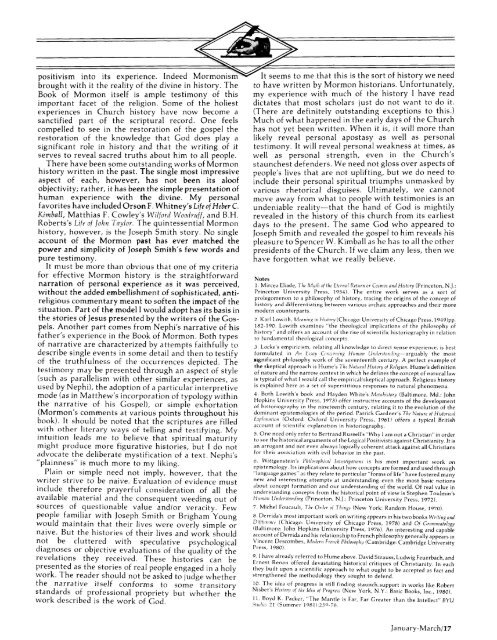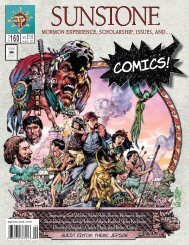from the editors - Sunstone Magazine
from the editors - Sunstone Magazine
from the editors - Sunstone Magazine
You also want an ePaper? Increase the reach of your titles
YUMPU automatically turns print PDFs into web optimized ePapers that Google loves.
positivism into its experience. Indeed Mormonism<br />
brought with it <strong>the</strong> reality of <strong>the</strong> divine in history. The<br />
Book of Mormon itself is ample testimony of this<br />
important facet of <strong>the</strong> religion. Some of <strong>the</strong> holiest<br />
experiences in Church history have now become a<br />
sanctified part of <strong>the</strong> scriptural record. One feels<br />
compelled to see in <strong>the</strong> restoration of <strong>the</strong> gospel <strong>the</strong><br />
restoration of <strong>the</strong> knowledge that God does play a<br />
significant role in history and that <strong>the</strong> writing of it<br />
serves to reveal sacred truths about him to all people.<br />
There have been some outstanding works of Mormon<br />
history written in <strong>the</strong> past. The single most impressive<br />
aspect of each, however, has not been its aloof<br />
objectivity; ra<strong>the</strong>r, it has been <strong>the</strong> simple presentation of<br />
human experience with <strong>the</strong> divine. My personal<br />
favorites have included Orson F. Whitney’s Life ofHeber C.<br />
Kimball, Matthias F. Cowley’s Wilford Woodruff, and B.H.<br />
Roberts’s Life of John Taylor. The quintessential Mormon<br />
history, however, is <strong>the</strong> Joseph Smith story. No single<br />
account of <strong>the</strong> Mormon past has ever matched <strong>the</strong><br />
power and simplicity of Joseph Smith’s few words and<br />
pure testimony.<br />
It must be more than obvious that one of my criteria<br />
for effective Mormon history is <strong>the</strong> straightforward<br />
narration of personal experience as it was perceived,<br />
without <strong>the</strong> added embellishment of sophisticated, antireligious<br />
commentary meant to soften <strong>the</strong> impact of <strong>the</strong><br />
situation. Part of <strong>the</strong> model I would adopt has its basis in<br />
<strong>the</strong> stories of Jesus presented by <strong>the</strong> writers of <strong>the</strong> Gospels.<br />
Ano<strong>the</strong>r part comes <strong>from</strong> Nephi’s narrative ofhis<br />
fa<strong>the</strong>r’s experience in <strong>the</strong> Book of Mormon. Both types<br />
of narrative are characterized by attempts faithfully to<br />
describe single events in some detail and <strong>the</strong>n to testify<br />
of <strong>the</strong> truthfulness of <strong>the</strong> occurrences depicted. The<br />
testimony may be presented through an aspect of style<br />
(such as parallelism with o<strong>the</strong>r similar experiences, as<br />
used by Nephi), <strong>the</strong> adoption of a particular interpretive<br />
mode (as in Mat<strong>the</strong>w’s incorporation of typology within<br />
<strong>the</strong> narrative of his Gospel), or simple exhortation<br />
(Mormon’s comments at various points throughout his<br />
book). It should be noted that <strong>the</strong> scriptures are filled<br />
with o<strong>the</strong>r literary ways of telling and testifying. My<br />
intuition leads me to believe that spiritual maturity<br />
might produce more figurative histories, but | do not<br />
advocate <strong>the</strong> deliberate mystification of a text. Nephi’s<br />
"plainness" is much more to my liking.<br />
Plain or simple need not imply, however, that <strong>the</strong><br />
writer strive to be naive. Evaluation of evidence must<br />
include <strong>the</strong>refore prayerful consideration of all <strong>the</strong><br />
available material and <strong>the</strong> consequent weeding out of<br />
sources of questionable value andjor veracity. Few<br />
people familiar with Joseph Smith or Brigham Young<br />
would maintain that <strong>the</strong>ir lives were overly simple or<br />
naive. But <strong>the</strong> histories of <strong>the</strong>ir lives and work should<br />
not be cluttered with speculative psychological<br />
diagnoses or objective evaluations of <strong>the</strong> quality of <strong>the</strong><br />
revelations <strong>the</strong>y received. These histories can be<br />
presented as <strong>the</strong> stories of real people engaged in a holy<br />
work. The reader should not be asked to judge whe<strong>the</strong>r<br />
<strong>the</strong> narrative itself conforms to some transitory<br />
standards of professional propriety but whe<strong>the</strong>r <strong>the</strong><br />
work described is <strong>the</strong> work of God.<br />
It seems to me that this is <strong>the</strong> sort of history we need<br />
to have written by Mormon historians. Unfortunately,<br />
my experience with much of <strong>the</strong> history I have read<br />
dictates that most scholars just do not want to do it.<br />
(There are definitely outstanding exceptions to this.)<br />
Much of what happened in <strong>the</strong> early days of <strong>the</strong> Church<br />
has not yet been written. When it is, it will more than<br />
likely reveal personal apostasy as well as personal<br />
testimony. It will reveal personal weakness at times, as<br />
well as personal strength, even in <strong>the</strong> Church’s<br />
staunchest defenders. We need not gloss over aspects of<br />
people’s lives that are not uplifting, but we do need to<br />
include <strong>the</strong>ir personal spiritual triumphs unmasked by<br />
various rhetorical disguises. Ultimately, we cannot<br />
move away <strong>from</strong> what to people with testimonies is an<br />
undeniable reality--that <strong>the</strong> hand of God is mightily<br />
revealed in <strong>the</strong> history of this church <strong>from</strong> its earliest<br />
days to <strong>the</strong> present. The same God who appeared to<br />
Joseph Smith and revealed <strong>the</strong> gospel to him reveals his<br />
pleasure to Spencer W. Kimball as he has to all <strong>the</strong> o<strong>the</strong>r<br />
presidents of <strong>the</strong> Church. If we claim any less, <strong>the</strong>n we<br />
have forgotten what we really believe.<br />
Notes<br />
1. Mircea Eliade, The Myth of <strong>the</strong> Eternal Return or Cosmos and History (Princeton, N.J.:<br />
Princeton University Press, 1954). The entire work serves as a sort of<br />
prolegomenon to a philosophy of history, tracing <strong>the</strong> origins of <strong>the</strong> concept of<br />
history and differentiating between various archaic approaches and <strong>the</strong>ir more<br />
modern counterparts.<br />
2. Karl Lowith, Meanin,~ in History (Chicago: University of Chicago Press, 1949)pp.<br />
182-190. Lowith examines "<strong>the</strong> <strong>the</strong>ological implications of <strong>the</strong> philosophy of<br />
history" and offers an account of <strong>the</strong> rise of scientific historiography in relation<br />
to fundamental <strong>the</strong>ological concepts.<br />
3. Locke’s empiricism, relating all knowledge to direct sense experience, is best<br />
formulated in An Essay Concerning Human Understanding--arguably <strong>the</strong> most<br />
iignificant philosophy work of <strong>the</strong> seventeenth century. A perfect example of<br />
<strong>the</strong> skeptical approach is Hume’s The Natural History of Religion. Hume’s definition<br />
of nature and <strong>the</strong> narrow context in which he defines <strong>the</strong> concept of natural law<br />
is typical of what I would call <strong>the</strong> empiricallskeptical approach. Religious history<br />
is explained here as a set of superstitious responses to natural phenomena.<br />
4. Both Lowith’s book and Hayden White’s Metahistory (Baltimore, Md.: John<br />
Hopkins University Press, 1973) offer instructive accounts of <strong>the</strong> development<br />
of historiography in <strong>the</strong> nineteenth century, relating it to <strong>the</strong> evolution of <strong>the</strong><br />
dominant epistemologies of <strong>the</strong> period. Patrick Gardner’s The Nature of Historical<br />
Explanation (Oxford: Oxford University Press, 1961) offers a typical British<br />
account of scientific explanation in historiography.<br />
5. One need only refer to Bertrand Russell’s "’Why I am not a Christian" in order<br />
to see <strong>the</strong> historical arguments of <strong>the</strong> Logical Positivists against Christianity. It is<br />
an arrogant and not even always logically coherent attack against all Christians<br />
for <strong>the</strong>ir association with evil behavior in <strong>the</strong> past.<br />
6. Wittgenstein’s Philosop]tical Investigations is his most important work on<br />
epistemology. Its implications about how concepts are formed and used through<br />
"language games" as <strong>the</strong>y relate to particular "forms of life" have fostered many<br />
new and interesting attempts at understanding even <strong>the</strong> most basic notions<br />
about concept formation and our understanding of <strong>the</strong> world. Of real value in<br />
understanding concepts <strong>from</strong> <strong>the</strong> historical point of view is Stephen Toulmin’s<br />
Human Understamtin,q (Princeton, N.J.: Princeton University Press, 1972).<br />
7. Michel Foucault, The Order o! Things (New York: Random House, 1970).<br />
8. Derrida’s most important work on writing appears in his two books Writing and<br />
Diflh’rence (Chicago: University of Chicago Press, 1978) and Of Grammatolo$y<br />
(Baltimore: John Hopkins University Press, 1976). An interesting and capable<br />
account of Derrida and his relationship to French philosophy generally appears in<br />
Vincent Descombes, Modern French Philosophy (Cambridge: Cambridge University<br />
Press, 1980).<br />
9. I have already referred to Hume above. David Strauss, Ludwig Feuerbach, and<br />
Ernest Renan offered devastating historical critiques of Christianity. In each<br />
<strong>the</strong>y built upon a scientific approach to what ought to be accepted as fact and<br />
streng<strong>the</strong>ned <strong>the</strong> methodology <strong>the</strong>y sought to defend.<br />
10. The idea of progress is still finding staunch, support in works like Robert<br />
Nisbet’s History of <strong>the</strong> Idea of Progress (New York, N.Y.: Basic Books, Inc., 1980).<br />
11. Boyd K. Packer, "The Mantle is Far, Far Greater than <strong>the</strong> Intellect" BYU<br />
~qtudics 21 (Summer 1081 ):250-78.<br />
January-March/17

















